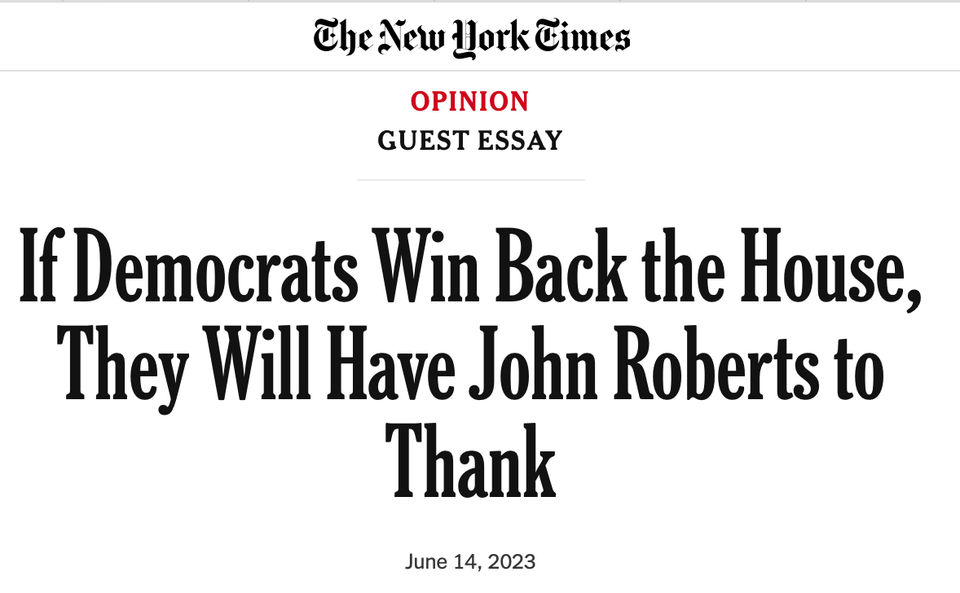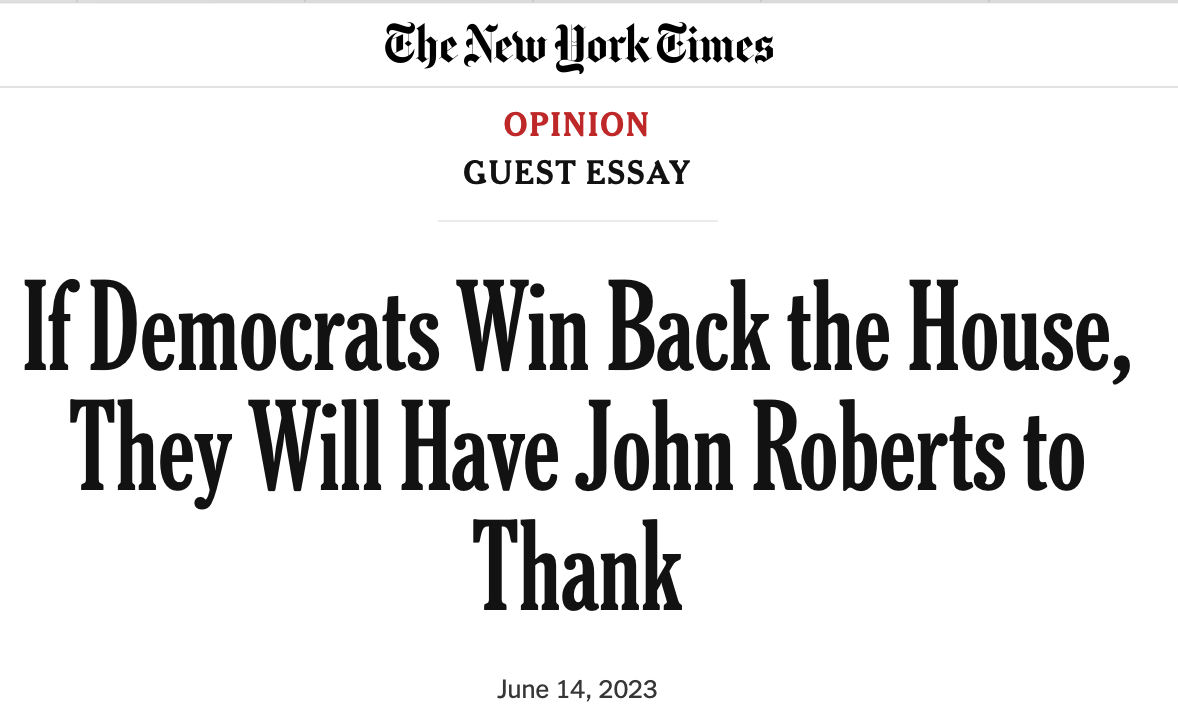No, you do not gotta hand it to John Roberts

Nope:

That’s Thomas Edsall writing in The New York Times, and it’s a bunch of nonsense.
Edsall’s premise is that last week’s Allen v. Milligan decision in which the Supreme Court declined to further eviscerate the Voting Rights Act “will quite possibly result in the replacement of as many as five majority-white Republican districts with majority-minority Democratic districts,” which could provide the margin for a Democratic takeover of the House of Representatives.
This is offensive, and dumb, and offensively dumb, in a number of ways.
First: No, we absolutely should not thank John Roberts for not further weakening the Voting Rights Act. That’s all that happened — Roberts and the Court didn’t expand or strengthen the VRA, they just … didn’t weaken it. They left it alone.1 This time. We typically don’t thank people for not doing a bad thing. When is the last time you thanked someone for not stealing your wallet? When is the last time you thanked someone for not stealing your wallet again?2
Second, Edsall inexplicably ignores the history of Allen v. Milligan. Slate’s Mark Joseph Stern explained last year:
An early test came when voting rights advocates filed a lawsuit against Alabama’s new congressional map, which packed most Black residents into a single, sprawling district, then sprinkled the rest throughout overwhelmingly white districts. Again: It’s hard to think of a clearer example of illegal racist redistricting. The map was so egregious that a three-judge district court with two Donald Trump appointees struck it down in January, writing a meticulous 225-page opinion rigorously applying the VRA. (The case is called Merrill v. Milligan.) Alabama promptly asked the Supreme Court to halt the decision.
On Feb. 7, by a 5–4 vote, SCOTUS agreed, issuing a stay that ensured the gerrymandered map would remain in effect for the midterms. The majority did not offer a single sentence of explanation or analysis. [emphasis in original]
Alabama drew extremely racist congressional maps that so blatantly violated the Voting Rights Act that a district court dominated by Trump appointees struck it down. Then the Supreme Court stepped in and forced the map to remain in place for the 2022 elections. As Stern explained, “under a conservative estimate…the Supreme Court’s suspension of the VRA lost Democrats seven seats. However, given the party’s strong showing on Tuesday…eight to 10 seats is a more realistic estimate.”3 Even that conservative estimate of seven seats is enough to have handed Republicans control of the House of Representatives. And remember, that Alabama map — the one the Supreme Court interceded last year to keep in place for the 2022 elections — is the same one the Court last week acknowledged violates the Voting Rights Act.
Edsall portrays last week’s Supreme Court decision as a boon to Democrats; the truth is that last year’s Supreme Court decision in the same case handed control of the House of Representatives to Republicans. Edsall ignores this history entirely — there isn’t so much as a hint of it in the more than 2,800 words in his essay.4 In short: Last year the Supreme Court stole the Democrats’ wallet; last week the Court gave the wallet back. And Thomas Edsall thinks Democrats should thank the Court for giving them a wallet.

Then there’s the rather important fact that Allen v. Milligan is not the only way John Roberts and the Supreme Court have influenced the way our elections are conducted. Not even close. Roberts has waged a “decades-long crusade” against the Voting Rights Act,5 highlighted by his shameful 2013 Shelby County v. Holder decision gutting the VRA on the preposterous premise that racism is no longer a factor in voting rights. Two years ago in Brnovich v. Democratic National Committee, Roberts and the Court again weakened the VRA. Plus Supreme Court decisions inviting a flood of corporate money into our elections (Citizens United) and weakening organized labor (too many to mention.) All of these decisions and more have helped Republicans win elections. Ignoring them and focusing only on last week’s Allen v. Milligan decision in order to portray the Court as helping Democrats win control of the House is preposterous.
Even if Allen v. Milligan could reasonably be portrayed as the Court taking action that helps Democrats (and, again, it cannot) the net effect of all of the Court’s actions relating to the conduct of our elections is a significant advantage to Republicans.
What’s left of it, anyway. ↩
Remember, John Roberts is the guy who wrote the 2013 Shelby County v Holder decision gutting the Voting Rights Act. ↩
Not all of these seats are in Alabama: The Supreme Court’s stay forcing the Alabama maps in place effectively ensured similarly-gerrymandered maps in Georgia, Louisiana, South Carolina, and Texas would remain in place. ↩
Edsall’s piece consists largely of quotes from various legal and political experts — 10 in all, only one of whom — Harvard’s Guy-Uriel Emmanuel Charles — is Black. This, remember, is a piece about a Supreme Court decision involving racially gerrymandered districts that dilute the voting power of Black voters. Perhaps Edsall would’ve included some mention of the harm last year’s SCOTUS decision did to Black voters if he bothered to talk to more than one Black expert. Guy-Uriel Emmanuel Charles did tell Edsall “The first thing to understand about Milligan is that is does not shift the status quo,” which Edsall probably should have taken as an indication that his premise was wrong. ↩
“John seemed like he always had it in for the Voting Rights Act,” according to a colleague who served with Roberts’ in the Justice Department during the Reagan administration. ↩
Member discussion